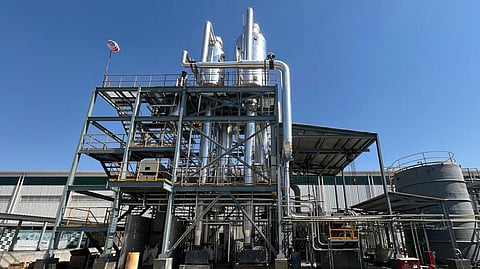Achieving Zero Liquid Discharge (ZLD) in the Textile Industry: Technologies, Benefits, and Compliance Strategies
The textile industry, one of India’s largest contributors to industrial output and employment, also ranks among the top water-consuming and polluting sectors. From dyeing to washing, every stage of textile processing generates a significant volume of wastewater loaded with dyes, salts, chemicals, and organic pollutants.
In response to rising environmental concerns and strict pollution control norms, Zero Liquid Discharge (ZLD) has emerged as a transformative solution for sustainable wastewater management in the textile sector. ZLD systems not only help industries meet regulatory standards but also pave the way for water reuse, resource recovery, and long-term operational efficiency.
As sustainability becomes a strategic imperative, Water Today’s Water Expo – Chennai 2026 will spotlight the latest in ZLD technologies tailor-made for textile processing units.
What is Zero Liquid Discharge (ZLD)?
Zero Liquid Discharge (ZLD) is a wastewater treatment process in which no liquid waste leaves the facility. All wastewater is treated, recycled, and reused, while the remaining solids are safely disposed of or processed for resource recovery.
ZLD is especially relevant in textile clusters like Tirupur, Ludhiana, Surat, and Panipat, where water scarcity, pollution control mandates, and sustainability goals demand high-efficiency treatment systems.
How ZLD Works in the Textile Industry
A typical ZLD system for textile effluent includes the following stages:
1. Primary and Secondary Treatment
Equalization tanks to balance flow and load
Primary clarifiers for suspended solids
Biological treatment (Aerobic/MBBR/SBR) to reduce BOD & COD
2. Tertiary Treatment
Ultrafiltration (UF) for solid-liquid separation
Reverse Osmosis (RO) for water recovery (up to 85–90%)
3. Evaporation and Crystallization
Multiple Effect Evaporators (MEE) or Mechanical Vapor Recompression (MVR) systems to concentrate brine
Crystallizers to recover salts and convert brine to solids
4. Sludge Handling
Filter presses and centrifuges to reduce and safely dispose of sludge
The outcome? 100% water recycling, zero discharge, and recovery of useful by-products like sodium sulfate or sodium chloride.
Benefits of ZLD in the Textile Sector
Environmental Compliance
Adheres to CPCB and State Pollution Control Board (SPCB) norms
Eliminates untreated discharge into water bodies
Water Reuse
Recycles up to 95% of process water
Reduces dependence on freshwater sources
Resource Recovery
Recovers salts and chemicals for potential reuse
Minimizes environmental and landfill impact
Improved Brand Value
Meets global supply chain sustainability standards
Enhances brand reputation among eco-conscious buyers
Long-Term Savings
Lower water procurement costs
Reduced pollution control penalties
Efficient operation with advanced automation
Technologies Driving Textile ZLD Today
High-Recovery RO Systems: Specialized membranes for dye-laden effluents
MBR and MBBR Reactors: Compact biological treatment units
MEE + Crystallizer: Thermal systems with improved energy efficiency
AI-Powered Monitoring Systems: Real-time tracking for flow, pH, TDS, and efficiency
Solar Sludge Dryers: Eco-friendly and cost-effective sludge management
Real-World ZLD Success: Tirupur Textile Cluster
In Tirupur, a major hub for cotton knitwear, more than 18 Common Effluent Treatment Plants (CETPs) have implemented ZLD systems. These plants treat millions of litres of textile wastewater daily, recover clean water for reuse, and meet all discharge norms, turning a major pollution problem into an opportunity for resource efficiency.
Explore Textile ZLD Innovations at Water Today’s Water Expo – Chennai 2026
If you're a textile mill owner, consultant, EPC contractor, or environmental engineer, the Water Today’s Water Expo – Chennai 2026 is your gateway to the latest advancements in ZLD solutions.
What You’ll Find:
Live demos of modular ZLD systems
High-recovery RO systems with low fouling membranes
Next-gen MEE and crystallizers with reduced power consumption
Smart ZLD solutions integrated with IoT and SCADA platforms
Event Details:
Dates: 26 – 28 February 2026
Venue: Chennai Trade Centre, Nandambakkam
Organized by Water Today Pvt Ltd
This is a must-attend platform for those looking to adopt, upgrade, or scale their ZLD operations for textile wastewater treatment.

